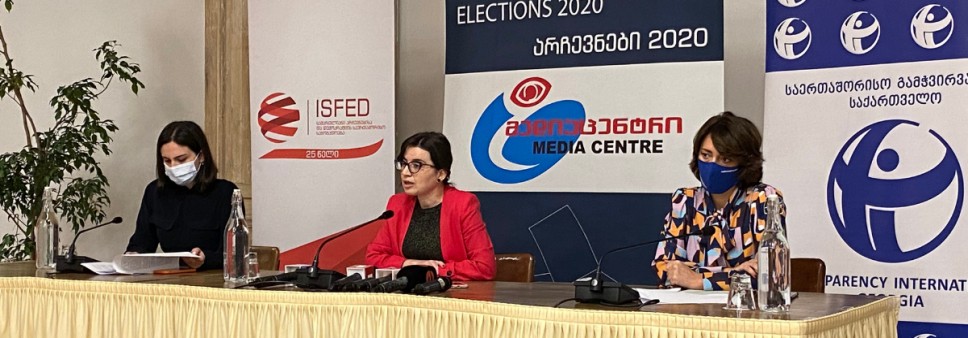

BRIEF SUMMARY, FULL ASSESSMENT AVAILABLE BELOW
In a joint statement, the International Society for Fair Elections and Democracy (ISFED), Transparency International Georgia, and The Georgian Charter of Journalistic Ethics reported on the pre-election environment and preparations for the Election Day of Georgia’s parliamentary elections this Saturday, 31 October.
COVID19 and CEC response
The Georgian organizations report that the election preparations and environment were significantly affected in a negative manner by the pandemic and associated challenges. The number of infected individuals saw a sharp rise with the approach of the Election Day. This has caused the healthcare registration system of infected and isolated individuals to not be up to date and struggling to keep up. The Central Election Commission (CEC) attempted to adopt a Decree two weeks prior to the election to regulate the issue of election participation of infected and isolated individuals, but this proved to be insufficient. There were also shortcomings in public communication and voters were not duly provided with important information. Due to these circumstances, the right to vote of thousands of voters was called into question.
Pre-election campaign
Before the pre-election campaign period, the central and local governments carried out large-scale social projects to reportedly counter the outbreak of COVID19. There was no clear visible boundary between the state and the ruling party during the implementation of said social projects. As a result, the ruling party entered the pre-election campaign with a clear advantage over other political parties.
Violence, threats, and intimidation in polarized election environment
Instances of physical confrontations and violence, which were mostly carried out against representatives of the opposition parties, constituted a significant challenge during the pre-election campaign. There was also an increase of threats and intimidation of voters, observers, activists, and representatives of the media during the pre-election environment.
Of grave concern are reports of blackmail against two female politicians, who have been threatened with the release of recordings of their private life. This puts female candidates in a particularly difficult situation and impedes women’s participation in politics. There are also reports of systemic damage to campaign materials across different municipalities.
The pre-election campaign was taking place against the backdrop of high polarization and exchange of accusations by parties/candidates. This environment was further aggravated by a polarized media environment and the rise of discrediting campaigns organized by anonymous groups on social networks. The use of such discrediting campaigns is particularly worrisome in terms of its negative effects during a pandemic when social media serves as a principle source of information.
Misuse of administrative (state) resources and vote buying
The COVID19 crisis prompted the state to carry out social support programs, however, there has been no clear boundary between the ruling party and the state during their implementation.
There have been no specific instances of municipal bodies engaging in political campaigning, however Majoritarian MPs and candidates were actively and openly involved in the process. Moreover, there has been a noticeable trend of ruling party candidates showing up at various program events that were financed by private companies and from state and/or local self-government budgets.
Alleged vote buying represented one of the most important challenges during the pre-election period. There have been over 60 instances of different political parties and candidates handing out physical goods or providing services to voters. The election campaigning of opposition parties included a comparatively less signs of vote buying in comparison to the activities of the ruling party’s candidates.
Participation of unauthorized persons in the election campaign
Persons restricted by law actively participated in election campaigning. These reportedly included local public servants and district election commission members attending election campaign events during working hours, foreign nationals, and high-ranking members of the Georgian Orthodox Church taking party in events organized by the ruling party.
Investigative agencies
The Ministry of Internal Affairs has launched an investigation into all instances of violence and in some cases quickly detained the suspects. According to the information provided by the Ministry, 59 investigations connected to elections were launched as of October 20. The Ministry is under criticism due to the low number of resolved cases. There was also an incident of the Prosecutor’s Office of Georgia attempting to discredit the former ruling party United National Movement.
Election administration
The formation of the precinct election commissions was mostly a formality. In most of the districts, the members of the commission had already decided on who to select from the pool of candidates and opposition requests to review these decisions were ignored in some districts or the request did not have enough support.
Campaign finance
Almost half of the total donations from all election subjects were received by the ruling Georgian Dream – Democratic Georgia party. There are still several visible trends in terms of political corruption where companies affiliated with the ruling party’s donors won tenders worth about GEL 47 million in 2020 (before October 1), in return for which they donated GEL 1.3 million in favor of the Georgian Dream during the same period.
Subscribe to our
newsletter
Sign up for our monthly newsletter
and receive the latest EPDE news
Sign up for our monthly newsletter and receive the latest EPDE news
Subscribe to our
newsletter
Sign up for our monthly newsletter
and receive the latest EPDE news
Subscribe to our
newsletter
Sign up for our monthly newsletter and receive the latest EPDE news